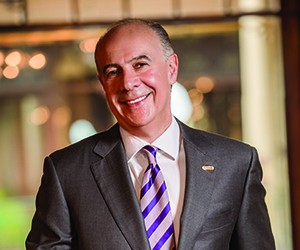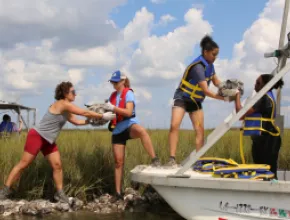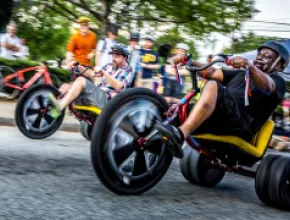You may have seen him on the “big stage” at many a meetings industry event, in his past role as chair of MPI or as part of a panel of experts on myriad subjects. Befitting his 35-year career in sales, marketing and executive positions serving the meetings industry in top organizations, Visit Orlando President & CEO George Aguel certainly doesn’t lack for exposure.
But while the Florida native cuts an impressive industry profile, many don’t know of the truly heartwarming, and maybe a bit brave, good works he does to help the most vulnerable in our society—children.
For the last seven years, Aguel has combined his love of motorcycling with a drive for giving back via his work with Bikers Against Child Abuse, or BACA, which helps victims of child abuse navigate the often terrifying process presented by the legal system.
“I’ve had a passion for motorcycles for a long time,” Aguel said. “I own a couple of Harleys. That’s my own personal form of recreation I give myself—the freedom of riding on the road with the wind in your face. It’s fun, but I also found by accident an organization called Bikers Against Child Abuse.”
Formed in 1997, BACA’s mission is to empower abused children that have to confront their tormentors in court, which is a horrifying ordeal for kids who have experienced physical and sexual abuse.
“The organization, when it began, recognized that children love motorcycles—they all do,” Aguel said. “But how can they find the courage to deal with the legal process, to testify against perpetrators?”
Welcoming the kids into the BACA family seems to be the best tactic, it turns out.
“The BACA family shows up at their home with a lot of motorcycles—we call it an Adoption Ceremony—and brings them into our motorcycle organization with a vest and a patch, gives them a road name and assigns members to be in touch with them every week,” Aguel explained. “We’ll be in touch with them for depositions if they have fear, and bikers will show up at their home if they feel insecure, and ultimately until they have to go to court to testify.”
Because of the nature of the legal system, BACA is sometimes one of the only allies the child has when going through the frequently traumatizing court process.
“The perpetrator’s friends or family could be in court, but many times family and friends can’t,” Aguel pointed out. “But they will see the bikers there, and then they can feel more secure testifying, and hopefully it results in a conviction. It’s a very unique mission and it has really made a difference in the lives of thousands of children, so my passion for motorcycles and fighting child abuse came together. I put a lot of my weekend time into doing this.”
Since joining the all-volunteer organization about seven years ago, Aguel has seen what these acts of kindness and protection can mean in the lives of children who have suffered sometimes unfathomable levels of abuse.
“From the time we meet them, they can be in terrific fear,” he said. “In many cases, they can be scared to talk to anybody. We find them going from that to being gregarious, doing well at school, and we never stop being there to say hello, even after their case is closed. The relationship never goes away.”
PageBreak
Given the gravity and responsibility of the work done by BACA, one might wonder where the high-functioning Aguel finds the time and energy. Besides heading Visit Orlando, he also serves as an Executive Committee member for the U.S. Travel Association, in addition to being on the U.S. Travel and Tourism Advisory Board and the board of PCMA.
“How you balance that is an individual choice,” Aguel said of navigating his work-charity balance, which also allows him to get out on the road with his wife, Ana. “In BACA, we always say that the priority is God, family, job and then BACA. The other priorities must be there, otherwise you won’t be successful in your volunteer efforts with BACA.”
Revving Up the Career
Interestingly enough, considering the consistency he’s demonstrated in his career climb, Aguel’s journey in the meetings and conventions industry began innocently enough in the tumult of the early 1970s, when the Republican National Convention came to Miami.
With Richard Nixon and Spiro Agnew the party’s presidential and vice presidential nominees that year, and the Vietnam War still raging, the city, like many others in America, was soon turned into a quasi-war zone, with protesters literally battling police in the streets.
“My [future] brother-in-law was convention services manager at the Doral in Miami Beach, and the RNC was being held there,” Aguel remembered, perhaps not quite knowing what he was getting himself into. “There was more law enforcement than I’ve ever seen in my life. But when we went inside the convention hall it was as you would imagine, with all the procedures going on to nominate Nixon and Agnew.”
Also in attendance was a long-haired, scruffy-looking Vietnam veteran in a tattered uniform, using a wheelchair and getting very vocal with delegates before being tossed. Turns out it was former Marine Staff Sgt. Ron Kovic, whose autobiography Born on the Fourth of July was turned into a critically acclaimed film starring Tom Cruise, with that very scene depicted in the movie.
“We were seated right in front of this guy, and only when the movie came out many years later did we realize it was him,” Aguel said. “That was my first convention experience, and I thought, ‘If this is what it’s like I could enjoy doing this!”
From the societal tumult of the early ’70s, Aguel’s career started humbly but soon experienced a rapid growth curve.
“I started working at the hotel in an hourly role and went from one job to the next, and then on to other Florida resorts,” he said, including what is now the Marriott Marco Island Resort and Innisbrook Resort and Golf Club, where he held positions such as catering manager, convention manager and director of convention and catering services.
From there, opportunity soon came knocking in a big way in the form of industry sales and marketing legend Mike Dimond, who worked for Doral but lured Aguel away from Florida for a top sales position at a new Nashville, Tenn., property that would transform the meetings industry, the Gaylord Opryland Resort.
“My first reaction was, ‘Why should I live in Nashville,’ but once I saw the complex and the project, I thought, ‘This is a winner!’” he remembered. “I could see the future and that the culture of the company was terrific. The general manager of the hotel, another legend and great leader, Jack Vaughn, had a vision and definitely developed that vision over the years.”
The sheer size of the facility—still considered on the mammoth side of meetings facilities just because of its footprint—represented a challenge that the young Aguel seized upon.
“It was unique back then to have a 600-room hotel with 90,000 square feet of meeting space—that was considered a significant amount of space at the time,” Aguel said. “And at the time no one would’ve thought of bringing a national convention to Nashville, so my job was to sell Nashville as a national meetings destination. By the time I left, it had become an 1,800-room hotel with even more meeting space, and we were able to put Nashville on the map and put the Opryland on the map.
“Sometimes in our industry you never know how you fall into it and what prompts it,” he surmised.
PageBreak
The Mouse Calls
Aguel’s good fortune of being recruited by hospitality industry legends was far from over, as 12 years later one of the biggest names in the history of hospitality and entertainment showed interest, The Walt Disney Company.
“There wasn’t any reason to leave until Disney called, and that really changed the dynamic,” Aguel said. “Michael Eisner was the CEO at that time, and he just announced the ‘Disney Decade,’ with a mission to dramatically expand the company’s position in Walt Disney World, especially on the resort side, since they were not in the hotel business in any meaningful way at all. I took on the role as vice president of resort sales and marketing to put Disney on the map in the hotel industry.”
Besides bringing him back to Florida, where his family was, Aguel recognized this as a career-making opportunity.
“I would not have left Gaylord for just any opportunity, but this was Disney, and Eisner was an absolute creative genius, rightfully called the successor to Disney himself,” Aguel said. “For me it was a chance to be part of something very bold and different. He was a very hands-on CEO—he would pick up the phone and call you for any reason, but you realized you were among a person who had an ability about him that was very special.
“Content and creativity are critical,” Aguel continued. “You have to keep a creative and an innovative focus. You want to lead and be sure that you’re doing something different than anyone else, respecting the brand but expanding the brand in ways that are bold and creative.”
Aguel gave an example of how that vision came to full fruition after Eisner returned from a trip to Japan, where he attended a destination wedding, a concept at that time foreign to the U.S.
“They wouldn’t just go to a wedding in Japan and go home, they would go to a city and spend a couple of days vacationing in it,” he said. “Eisner said, ‘We should start a destination wedding business at Disney World.’ It seemed like a hard one to envision, but he said he could envision it happening, so lucky me—I was assigned to make it happen.”
Disney World launched the idea in 1992, building a wedding chapel over its Seven Seas Lagoon, with Cinderella’s Castle in the background, and branded it “Disney’s Fairy Tale Weddings.” This kernel of an idea grew to the theme park holding some 2,000 weddings per year, with people from all over the world coming to tie the knot, relatives and well-wishers in tow.
“Where else can you be married and brought to the wedding in Cinderella’s carriage, with the groom arriving as Prince Charming on a horse?” Aguel asked.
This lesson, and others learned via Eisner’s attention to detail and dedication to creativity, has served as an inspiration ever since.
“It seemed way out there, but he could see the picture and what the brand could do with that,” Aguel said. “I’ve tried to recognize the creativity in everything we do and everything we try to accomplish [at Visit Orlando].”
It was his work with Disney and the Disney Institute—an on-site organizational leadership development and performance company he managed for some 20 years—that really sharpened his understanding of the role of organizational structure and strategy, which he brought with him to Visit Orlando when he joined the CVB about three-and-a-half years ago.
“I definitely didn’t set out to be in the CVB business,” he said. “I was engaged in it for many years on the [Visit Orlando] board and ultimately as chairman, so I felt I had a real understanding of what it meant. Here, I could see that I had a great opportunity to represent everyone in our Orlando tourism industry—we’re the most-visited family destination in the world, number-one in overall meetings and number-two in significant trade shows. I find it a privilege. It’s an important role to represent the brand of Orlando. It’s a household name, so you have to manage it the right way.”
Sage Career Advice
For those just finding their way in the meetings and conventions world and who are inspired by stories such as Aguel’s—of which there are many in the heavily merit-based industry—his advice is fairly simple.
“Try to identify what you feel you can be passionate about,” he offered. “If it’s just a job, it’s not going to be as helpful as a mission and something you enjoy. You have to look forward to doing it, and a service mentality is crucial. To be successful, you have to be respectively competitive, but competitive, and believe in what you’re doing and the organization you represent.”
And finally, the words of wisdom that you can’t do it all by yourself are perhaps the most critical part of the formula for success.
“Try to seek out mentors for sage advice in those moments when you have to make critical decisions,” he advised. “It’s essential to have that sort of mentor relationship, and they’re not going to find you, you’re going to have to find them. And as Jack Vaughn used to always tell me, as a leader, you will only be as successful as your employees allow you to be. All of that sounds very basic, but it works. It’s what you’ve got to do.”
Relevant Links
Visit Orlando
Bikers Against Child Abuse







